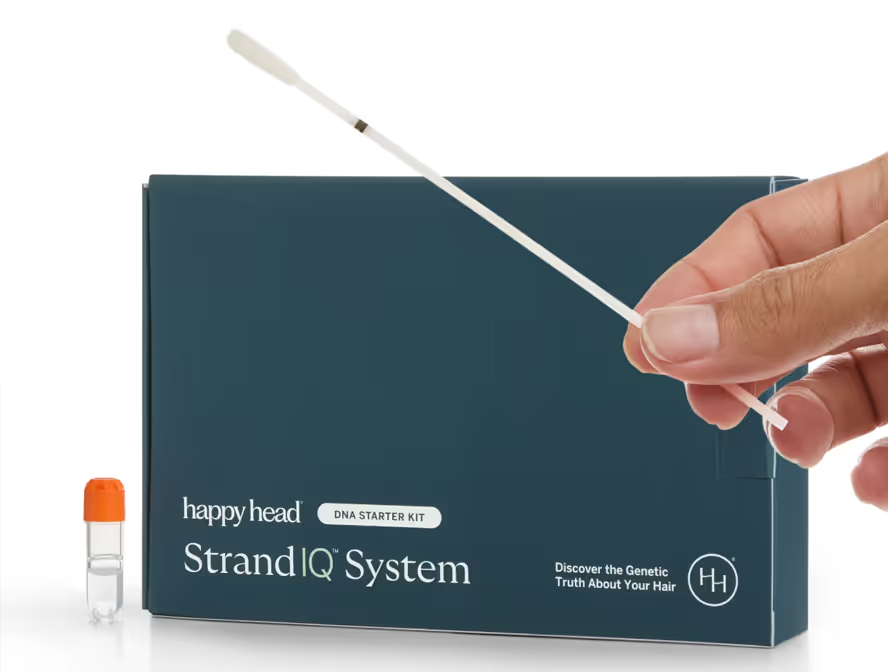Gut health and hair loss are more connected than most people realize. While many people focus on topical treatments or hormone levels, the root cause of hair thinning can often lie deeper, within the digestive system.
A healthy gut helps regulate inflammation, absorb nutrients, balance hormones, and support immune function, all of which play critical roles in hair growth.
This comprehensive guide explores the gut-hair connection in depth, from the microbiome to nutrient deficiencies, and offers actionable steps to support both your scalp and your digestive system.
Understanding Gut Health
Gut health refers to the optimal functioning of the gastrointestinal (GI) system—especially the small and large intestines—and the balance of microorganisms that live there.
A healthy gut supports digestion, nutrient absorption, immune function, and inflammation control. It also plays a key part in synthesizing certain vitamins and regulating hormones, both of which are essential for hair growth.
Disruptions in gut health can impair these processes, leading to widespread effects on the body, including the skin and hair. For those with unexplained hair thinning or shedding, considering the gut’s role may help uncover hidden contributing factors.
The gut is a central regulator of systemic health, and its impact on conditions such as alopecia, telogen effluvium, and even seborrheic dermatitis is an area of growing interest.
The Gut Microbiome
The gut microbiome is the complex community of trillions of microorganisms, including bacteria, fungi, viruses, and protozoa, that reside primarily in the large intestine.
These microbes are not harmful; in fact, many are essential for health. They help digest food, produce short-chain fatty acids, synthesize B vitamins and vitamin K, modulate immune function, and regulate inflammation.
A well-balanced microbiome also supports the integrity of the gut lining, preventing the leakage of harmful substances into the bloodstream.
Disruption of this microbial balance—known as dysbiosis—can lead to systemic inflammation and impaired nutrient absorption, both of which can negatively impact the hair follicle.
Certain bacterial strains even influence hormone metabolism and stress resilience, indirectly supporting the anagen (growth) phase of hair, and specific gut microbiota compositions may correlate with scalp health and inflammatory skin conditions.
This makes the microbiome a potential therapeutic target not only for GI and metabolic health, but also for maintaining healthy skin and hair.
Healthy Gut vs. Unhealthy Gut
A healthy gut features a diverse and balanced microbiome, an intact intestinal lining, efficient digestion, and regular elimination. People with healthy guts typically experience minimal bloating, strong immunity, stable energy levels, and proper absorption of nutrients.
In contrast, an unhealthy gut often presents with symptoms such as bloating, gas, constipation or diarrhea, fatigue, food intolerances, skin flare-ups, and hair thinning. The underlying issues may include dysbiosis, leaky gut syndrome, low stomach acid, or enzyme deficiencies.
These dysfunctions impair nutrient uptake, especially of hair-essential vitamins such as B12, zinc, and iron, and may promote systemic inflammation that disrupts the hair cycle.
Additionally, chronic gut imbalances can affect cortisol regulation and immune function, potentially contributing to telogen effluvium or autoimmune-related hair loss.
Identifying whether a patient has signs of poor gut health can help inform more holistic dermatologic care, particularly when conventional hair loss treatments yield suboptimal results.
How Gut Health and Hair Loss Are Linked
The gut and hair may seem unrelated, but they are intricately connected through pathways involving nutrient absorption, immune regulation, inflammation, and hormonal signaling.
Hair follicles are highly sensitive mini-organs that require consistent nourishment and systemic stability.
When the gut is functioning poorly, it can disrupt this balance in several ways. For example, nutrient deficiencies due to malabsorption can deprive the hair follicle of essential building blocks.
Chronic inflammation originating in the gut can disturb the normal hair cycle, pushing follicles prematurely into the shedding (telogen) phase. Additionally, gut imbalances can alter stress hormone levels and immune responses, further compounding hair loss.
While not the sole cause of hair loss, gut dysfunction can significantly worsen or prolong it.
How the Gut Microbiome Influences Hair Growth
The gut microbiome influences hair growth through its effects on nutrient metabolism, immune function, and inflammation control. Beneficial gut bacteria help synthesize and absorb key nutrients needed for hair health, such as biotin, folate, and B12.
They also produce short-chain fatty acids that maintain the integrity of the gut lining and reduce systemic inflammation, both of which are essential for supporting the hair growth cycle.
An imbalanced microbiome, or dysbiosis, can lead to increased intestinal permeability ("leaky gut"), which allows inflammatory compounds to enter the bloodstream. This systemic inflammation can impair follicle function and disrupt the hair cycle.
In some cases, dysbiosis may even worsen autoimmune activity, as seen in conditions such as alopecia areata. Additionally, gut bacteria help regulate cortisol levels and modulate the hypothalamic-pituitary-adrenal (HPA) axis, which impacts stress-induced hair shedding.
Signs of Poor Gut Health That May Affect Hair
Several signs of poor gut health may signal an increased risk of hair thinning or shedding. Digestive symptoms such as bloating, gas, constipation, or chronic diarrhea suggest impaired digestion and possible dysbiosis, both of which can lead to nutrient deficiencies.
Systemic signs such as fatigue, frequent infections, or skin flare-ups (e.g., acne, eczema) may also point to a compromised gut. When hair loss accompanies these symptoms, it's often a reflection of the body's broader nutrient and inflammatory status.
Individuals with gut dysfunction often struggle to absorb iron, zinc, vitamin D, and B-complex vitamins—all of which are essential for strong, healthy hair.
Additionally, poor gut health may contribute to hormonal imbalances or chronic stress, both of which can disrupt the hair growth cycle.
The Gut-Skin-Hair Axis Explained
The gut-skin-hair axis refers to the interconnected relationship between the gastrointestinal system, the skin, and the hair follicles. These three systems communicate through immune, endocrine, and neurochemical pathways.
The gut microbiome regulates not only digestion but also systemic inflammation, oxidative stress, and hormone metabolism—all of which influence skin and hair health.
When the gut is balanced, it helps maintain skin barrier integrity and supports the hair growth cycle. Conversely, dysbiosis and gut inflammation can trigger immune responses or hormonal fluctuations that negatively impact the scalp and follicles.
This axis helps explain why patients with chronic skin conditions such as acne, rosacea, or eczema often experience hair changes as well and why stress, diet, or antibiotics may affect both the gut and the hair.

How Gut Dysbiosis Can Lead to Hair Thinning
Gut dysbiosis—an imbalance in the intestinal microbiome—can contribute to hair thinning through multiple mechanisms. First, dysbiosis often compromises the integrity of the gut lining, leading to increased intestinal permeability or "leaky gut."
This allows bacterial endotoxins and partially digested food particles to enter the bloodstream, triggering systemic inflammation.
Chronic inflammation can impair microcirculation around the hair follicles and interfere with the normal progression of the hair growth cycle, particularly the anagen (growth) phase.
Dysbiosis can also reduce the bioavailability of nutrients essential for hair, including iron, biotin, and amino acids, due to impaired digestion and absorption.
Additionally, certain bacterial strains help metabolize and regulate hormones. Their absence may contribute to cortisol dysregulation or androgen excess, both of which are known contributors to hair loss.
The Role of Inflammation and Nutrient Absorption
Chronic, low-grade inflammation and poor nutrient absorption are two of the most direct ways in which gut dysfunction contributes to hair loss.
Inflammation originating in the gut can become systemic, disrupting blood flow to the scalp and impairing follicle activity. Over time, this inflammatory environment can push follicles into the telogen (shedding) phase prematurely.
Simultaneously, inflammation damages the intestinal lining, leading to reduced absorption of key nutrients required for hair growth, particularly iron, zinc, biotin, B vitamins, and essential fatty acids.
Even if a person follows a nutrient-dense diet, they may still experience deficiencies if gut function is compromised. Moreover, chronic inflammation can interfere with thyroid and adrenal function, further contributing to hair thinning.
Common Gut Conditions Associated With Hair Loss
Certain gastrointestinal disorders are closely associated with hair loss due to their impact on nutrient absorption, inflammation, and immune function.
In some cases, medications used to manage gut disorders (e.g., corticosteroids or immunosuppressants) can also contribute to thinning hair.
Understanding the link between chronic gut conditions and hair loss helps identify when gut issues might be contributing to hair problems and when gastrointestinal referral, diagnostic testing, or nutritional support may be appropriate components of a comprehensive hair restoration plan.
Irritable Bowel Syndrome, Inflammatory Bowel Disease, and Hair Loss
Irritable bowel syndrome (IBS) and inflammatory bowel disease (IBD) are both linked to increased rates of hair thinning and shedding, though through different mechanisms.
IBS is a functional disorder marked by digestive discomfort, bloating, and altered bowel habits. While it doesn’t involve visible intestinal damage, IBS often disrupts nutrient absorption and is associated with chronic stress and inflammation, all of which can compromise hair growth.
IBD, which includes Crohn’s disease and ulcerative colitis, is an autoimmune condition characterized by persistent inflammation and damage to the intestinal lining. This leads to significant malabsorption of iron, vitamin D, B12, and other nutrients critical for hair health.
Flare-ups in IBD can trigger systemic inflammation and immune dysregulation that affect the hair follicle. Patients with these conditions often experience telogen effluvium during active disease phases or after hospitalizations.
Malabsorption and Its Impact on Hair Health
Malabsorption syndromes, such as celiac disease, lactose intolerance, small intestinal bacterial overgrowth (SIBO), and pancreatic insufficiency, interfere with the body’s ability to absorb nutrients effectively.
These conditions can cause deficiencies in iron, zinc, biotin, vitamin A, B vitamins, and protein, all of which are essential for maintaining the hair growth cycle and the structural integrity of the hair shaft.
Malabsorption may also result in fat-soluble vitamin deficiencies (A, D, E, and K), which further compromise scalp and follicle health.
Hair thinning or diffuse shedding is often one of the first noticeable signs of a chronic absorption issue.
In celiac disease, for instance, gluten-induced intestinal damage often precedes or accompanies telogen effluvium. Similarly, SIBO can lead to vitamin B12 and iron deficiencies due to bacterial competition for nutrients.
Identifying and treating the root cause of malabsorption is critical for restoring hair growth. When hair loss persists despite topical hair growth products or supplements, underlying digestive dysfunction should be considered.
Nutritional Deficiencies, the Gut, and Hair Loss
Nutritional deficiencies are a leading cause of non-scarring hair loss, particularly when the gut is unable to properly absorb key vitamins and minerals.
The hair follicle is one of the most metabolically active structures in the body and relies on a steady supply of nutrients to sustain the growth (anagen) phase of the hair cycle.
Even mild deficiencies, especially in iron, vitamin D, biotin, and B12, can disrupt this process and lead to increased shedding or slower regrowth.
Many individuals consume adequate nutrients in their diet but still develop deficiencies due to impaired absorption, chronic inflammation, or dysbiosis. This is especially common in patients with underlying gut conditions such as celiac disease, Crohn’s disease, or SIBO.
Vitamins and Minerals Needed for Healthy Hair
Several micronutrients are vital for hair growth and follicle health.
- Iron is essential for oxygen transport to the follicles, and deficiency is a well-known cause of telogen effluvium.
- Vitamin D regulates the hair cycle and supports immune balance; low levels are often found in patients with alopecia areata.
- Zinc supports hair follicle recovery and keratin production.
- Biotin (vitamin B7) is involved in cellular energy and hair shaft integrity.
- Vitamin B12 is needed for DNA synthesis and red blood cell production, both of which influence hair growth.
- Vitamin A, while necessary in small amounts, can cause hair loss if deficient or if taken in excess.
Other important nutrients include omega-3 fatty acids, selenium, and cysteine, an amino acid needed for keratin formation. Identifying which nutrients are lacking through laboratory testing can help personalize treatment plans and ensure optimal support for hair regrowth.
How Gut Health Affects Nutrient Absorption
The gut is the primary site for nutrient digestion and absorption, so its health directly affects whether the body receives the vitamins and minerals needed for hair growth.
Conditions that impair gut function, such as inflammation, dysbiosis, or enzyme insufficiency, can reduce the availability of essential nutrients even when intake is adequate.
Damage to the intestinal lining, as seen in celiac disease or IBD, compromises the surface area needed for absorption.
Similarly, low stomach acid or pancreatic enzymes can inhibit the breakdown of proteins and fats, making it harder for the body to extract nutrients such as zinc, iron, and fat-soluble vitamins.
Chronic stress also impacts gut function by altering motility, decreasing enzyme output, and reducing microbial diversity. As a result, deficiencies may arise even without obvious digestive symptoms.
Support Gut Health and Reduce Hair Loss: Diet & Lifestyle Tips
Diet and lifestyle are foundational to both gut and hair health. What you eat, how you manage stress, and your daily habits can all affect microbial balance, inflammation, and nutrient availability—factors that directly influence hair follicles.
The strategies below offer practical ways to support both gut and hair from the inside out.
Dietary Changes To Improve Gut Health
Improving your gut through dietary changes begins with eliminating foods that inflame the GI tract and disrupt the microbiome.
Highly processed foods, added sugars, alcohol, and artificial additives are common culprits. These substances can alter microbial diversity, damage the gut lining, and promote inflammation, all of which impair nutrient absorption and, in turn, hair health.
A gut-supportive diet should emphasize anti-inflammatory, nutrient-dense whole foods. Leafy greens, colorful vegetables, legumes, nuts, seeds, and omega-3-rich fatty fish (such as salmon or sardines) all nourish the gut lining and supply antioxidants that protect hair follicles.
Fiber-rich foods such as oats, lentils, and flaxseeds feed beneficial gut bacteria, encouraging microbial diversity.
Equally important are prebiotic foods, such as garlic, onions, bananas, and asparagus, which fuel healthy bacteria, and fermented foods like kimchi, sauerkraut, kefir, and yogurt, which provide natural sources of probiotics.
Drinking enough water supports regular bowel movements and nutrient transport, while chewing thoroughly and eating without distraction helps activate digestive enzymes.
Managing Stress and Its Effect on the Gut and Hair
Chronic stress is a well-documented disruptor of both gut and hair health. Through the hypothalamic-pituitary-adrenal (HPA) axis, stress triggers the release of cortisol, a hormone that alters gut motility, reduces digestive enzyme output, and increases intestinal permeability.
These changes not only impair nutrient absorption but also promote dysbiosis and systemic inflammation, which are two known contributors to hair loss.
The gut-brain axis plays a central role in this process. Emotional stress affects the gut microbiome’s composition and function, and in turn, an imbalanced microbiome may influence mood and increase psychological distress.
This bidirectional communication can create a cycle where stress worsens gut health, which further impairs hair growth and leads to increased anxiety about hair loss.
Stress-induced hair loss often presents as telogen effluvium, where a large percentage of hair follicles prematurely enter the shedding phase. Addressing the stressor is key to reversing this condition.
Proactive stress management strategies include deep breathing exercises, meditation, yoga, regular physical activity, and sleep hygiene. Even short daily practices can reduce cortisol levels and support gut integrity.
Lifestyle Habits That Benefit Both Gut and Hair
Sleep is essential for tissue repair and hormone regulation. During deep sleep, the body restores immune balance and reduces inflammation. Poor sleep has been linked to microbiome imbalances and elevated cortisol, both of which are risk factors for hair loss.
Exercise improves circulation, enhances digestion, and stimulates the release of mood-regulating neurotransmitters that support gut-brain balance.
Moderate, consistent activity, such as walking, cycling, or strength training, can also help reduce insulin resistance, which is associated with hair thinning in both men and women.
Hydration is often overlooked. Water helps regulate bowel movements, flush toxins, and transport nutrients to the scalp and skin. Dehydration may lead to constipation and sluggish digestion, indirectly affecting nutrient status and hair quality.
Avoiding smoking, limiting alcohol, and minimizing unnecessary antibiotic use also protects the gut microbiome.
Improve Gut and Hair Health: Supplements & Microbiome Support
In addition to diet and lifestyle, certain supplements and targeted microbiome therapies can further support gut healing and hair restoration.
These options are especially useful for individuals with dysbiosis, recent antibiotic use, or nutrient deficiencies that persist despite dietary improvements.
The Role of Probiotics and Prebiotics
Probiotics and prebiotics work together to restore and maintain a healthy gut microbiome by creating conditions that support both digestive health and hair growth.
Probiotics are live microorganisms that help repopulate the gut with beneficial bacteria. They can improve microbial diversity, strengthen the intestinal lining, reduce inflammation, and even modulate immune responses associated with autoimmune hair loss (e.g., alopecia areata).
Specific strains such as Lactobacillus rhamnosus, Lactobacillus plantarum, and Bifidobacterium longum are thought to reduce gut inflammation and support the gut-skin axis.
Prebiotics are non-digestible fibers that feed these beneficial bacteria. Common sources include inulin, fructooligosaccharides (FOS), and galactooligosaccharides (GOS), found naturally in foods like chicory root, garlic, onions, and asparagus.
Prebiotics stimulate the production of short-chain fatty acids (such as butyrate), which nourish the gut lining and have anti-inflammatory effects that benefit the scalp and follicles.
For those with chronic shedding or poor response to topical treatments, a targeted probiotic and prebiotic regimen may help resolve hidden gut-related contributors to hair loss.
Using Topical Solutions While Improving Gut Health
While improving gut health is essential for long-term hair restoration, adding topical treatments can help protect and stimulate the hair follicles during the healing process.
Gut-related hair loss often takes time to reverse, especially when nutrient repletion and microbiome support are involved. In the meantime, high-quality topical solutions can help slow shedding, reactivate dormant follicles, and support regrowth by directly targeting the scalp.
Ingredients such as minoxidil, finasteride, and retinoids are commonly used to enhance blood flow, block DHT, and improve absorption of active compounds. These treatments complement internal strategies by providing localized support where it’s needed most.
For many individuals, this combination approach—addressing both internal and external factors—delivers better, faster, and more sustainable results.
Choosing the Right Approach for Hair Loss
Choosing the right topical approach depends on the type of hair loss, underlying causes, and individual skin sensitivity.
For example, those with androgenetic alopecia often benefit from DHT-blocking agents such as topical finasteride or dutasteride prescription products, which inhibit the hormone responsible for follicle miniaturization.

Individuals with diffuse shedding related to stress or nutritional issues may respond well to topical minoxidil, which stimulates blood flow and extends the anagen (growth) phase.
Topical solutions containing retinoic acid or tretinoin may be included to enhance absorption of active ingredients through the scalp.
Ketoconazole, an antifungal with anti-inflammatory properties, is another common addition that is especially helpful when inflammation or dandruff is present.
Many products, such as Happy Head’s Topical SuperSolution ProBlend, combine multiple active compounds in a single formula for convenience and improved adherence.
A personalized regimen prescribed by a dermatologist ensures safety, efficacy, and minimal side effects.
When To Seek Medical Advice for Gut Health and Hair Loss
If you're experiencing persistent or unexplained hair loss, especially when accompanied by digestive symptoms such as bloating, constipation, diarrhea, or unintended weight changes, it may be time to seek medical advice.
Hair thinning that doesn’t respond to over-the-counter treatments or dietary adjustments could be a sign of deeper systemic dysfunction, including nutrient malabsorption, chronic inflammation, or autoimmune activity rooted in the gut.
A dermatologist can evaluate the type and pattern of hair loss, perform scalp exams, and order lab tests to assess for deficiencies in iron, ferritin, vitamin D, B12, zinc, and thyroid function.
In some cases, stool testing, celiac screening, or referral to a gastroenterologist may be appropriate to investigate potential gut-related contributors such as inflammatory bowel disease, small intestinal bacterial overgrowth (SIBO), or leaky gut.
Patients recovering from illness, restrictive diets, or recent antibiotic use may also need medical guidance to rebuild gut health and restore nutrient status.
For the most effective outcomes, dermatologists often recommend a comprehensive plan that includes topical therapy, nutritional support, and, when indicated, collaboration with other specialists.
Gut Health and Hair Loss: Key Takeaways
Hair loss is often a symptom of deeper imbalances in the body, and the health of your gut plays a more significant role than many realize. By addressing digestive issues, improving nutrient absorption, and supporting your microbiome, you create a foundation for lasting hair growth.
Combining internal healing with topical solutions offers the most effective path to visible results. For anyone struggling with ongoing shedding, it’s worth exploring the powerful connection between gut health and hair loss.
Talk to a board-certified dermatologist to discuss your goals and find the solution that is best for you.
Frequently Asked Questions
Can gut issues cause hair loss?
Yes, gut issues can lead to hair loss by disrupting nutrient absorption, increasing inflammation, and affecting hormone balance. IBS, IBD, and gut dysbiosis may contribute to thinning hair or increased shedding over time. Elevated cortisol levels, common in those with gut dysfunction, can impair hair follicle function.
How do I heal my gut for hair growth?
Healing your gut to support hair growth involves addressing inflammation, restoring microbial balance, improving nutrient absorption, and reducing stress. Hydration and adequate protein intake are also key. Eat whole foods, avoid processed items, and add prebiotics and probiotics.
What are the symptoms of an unhealthy gut?
Because the gut is responsible for absorbing nutrients and maintaining immune balance, dysfunction can have ripple effects throughout the body. Common symptoms include bloating, gas, constipation, fatigue, brain fog, skin issues, hair thinning, and increased inflammation.
Do probiotics help with hair loss?
Probiotics may help with hair loss, especially when it is linked to gut imbalance, chronic inflammation, or nutrient malabsorption. Probiotics are beneficial bacteria that support a healthy gut microbiome, which in turn influences many systems essential to hair growth. Some strains also support immune and hormone regulation, which can aid hair growth.












